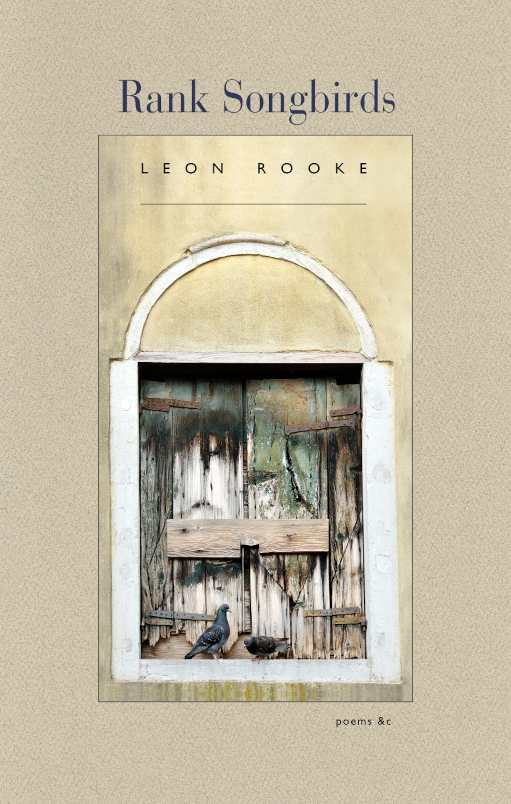Rank Songbirds
Rank Songbirds is a confident and challenging multigenre collection that places interpersonal concerns into historical and political context.
Novelist, essayist, and poet Leon Rooke’s literary collection Rank Songbirds is a slim, elegant book that blurs genre boundaries, connecting personal struggles to wider contexts.
Made up of untitled, numbered free verse poems that range in length from two lines to over two hundred lines, as well as numbered narrative prose paragraphs, this varied collection includes entries that are erudite, as well as ones that are vulgar. It is often self-referential, and it makes explicit literary allusions, too. In poem 44, for example, it pokes fun at William Carlos Williams’s canonical “The Red Wheelbarrow” by linking “those absurd chickens / by the white wheel / barrow” with a “deluded / critic.” This iconoclastic tone pervades the book, functioning as its organizing principle. Rules are made to be broken in these poems.
Wit and irony are central to the book’s coherence. One or the other informs almost every piece in the book, sometimes arising from unusual juxtapositions, as in poem 45, where characters drop their cloaks, and the speaker announces that this is a work about “sexual identity, the clothing industry / Bad weather, superior home schooling.” In other cases, the wit has the flavor of a private joke, and the images are detached, as in poem 43, where the pronouncement “Freedom is getting the falsetto notes right” leads into a question, “why / is that elephant sitting on you?”
Although the book doesn’t employ traditional metrical or rhyming patterns, there are ample slant rhymes, as well as uses of alliteration and assonance. The success of these sonic repetitions varies. Some of them add to the musicality of a piece, while others are played and re-played in a way that is reminiscent of slapstick comedy, used as a method of belittling institutions or characters. While the re-play strategy serves the book’s overall iconoclasm, it becomes monotonous.
Dynamic characterizations occur in the entries, as with a woman who appears in the book’s first poems as the speaker’s lover, and who transforms, in poem 11, into Cassandra, the prophetess who was disbelieved, and who is “Summoned again by another day’s heavy news, four schoolgirls / murdered in Alabama” in a 1963 white supremacist church bombing. Here and elsewhere, the book alludes to how powerful people focus on trivial pleasures even in the face of tragedies, resulting in a remarkable and sobering statement about human nature.
The final prose section of the poem reads like a play, with characters speaking each of its twenty-six parts. These include a man and a woman with a romantic history, and an unnamed narrator who intrudes with a more objective view of their relationship, employing irony at its best to question social customs and assumptions while revealing the circular nature of difficult, long relationships.
As it challenges the status quo in literature, politics, and relationships, this collection demands attentive reading. Rank Songbirds explores important questions of who is in charge and who is responsible, and it does so while assuming familiarity with broad swaths of Western culture.
Rank Songbirds is a challenging, iconoclastic multigenre collection that places interpersonal concerns into cultural and political context.
Reviewed by
Michele Sharpe
Disclosure: This article is not an endorsement, but a review. The publisher of this book provided free copies of the book and paid a small fee to have their book reviewed by a professional reviewer. Foreword Reviews and Clarion Reviews make no guarantee that the publisher will receive a positive review. Foreword Magazine, Inc. is disclosing this in accordance with the Federal Trade Commission’s 16 CFR, Part 255.

